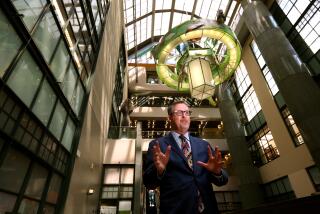Long Gone but Not Forgotten: Town Stakes Claim to Wilson Library
- Share via
STAUNTON, Va. — Woodrow Wilson lived in an old whitewashed house in this town for just a year after his birth. He returned only briefly in college before becoming the nation’s 28th president.
But locals aren’t letting Wilson’s lack of time in Staunton keep them from moving forward with plans to build a presidential library in his honor--an unusual step considering he left office 81 years ago.
Entering the presidential library business at this stage could be a major task. The National Archives’ Presidential Library System covers presidents only since Herbert Hoover, meaning that Wilson’s library will remain largely on its own.
The museum hasn’t begun raising the $10 million to $20 million for construction on the project, and museum officials are banking on a major federal grant.
“No question, the libraries that do best are the ones where the president is still living. They’re almost like English nobility: If a former president writes you and asks you to donate a few thousand dollars, you’re more likely to respond,” said Timothy Walch, director of the Herbert Hoover Presidential Library and Museum in West Branch, Iowa. “Those of us with presidents who are long passed from the scene must rely on the good will of our communities.”
The presidential library system was created in the 1930s as a way to provide public access to the papers, records and other historical materials of U.S. presidents. Many collections from presidents who served before the 1930s are in the Library of Congress, while others are split among libraries, historical societies and private collections.
Presidential libraries have become increasingly more elaborate and expensive in recent years. For example, former President Clinton’s is a $200-million project that includes 100 million documents.
Don Wilson, chairman of the Woodrow Wilson Library planning committee, believes that curiosity about the former president is keen. Wilson served two terms from 1913-21, leading the nation during World War I. He died in 1924.
“There’s a lot of interest in Woodrow Wilson out there that we can tap into,” said Wilson, who is no relation. “His internationalist message has never been more important.”
Nestled in the 19th-century part of the city, the house where Woodrow Wilson was born remains the nicest on the block. .
The presidential library would be built in the same neighborhood. It would house originals and copies of every document that Wilson penned from his years at Princeton to the presidency to his retirement in Washington, D.C.
Wilson’s father, Joseph, was pastor of the Presbyterian church in Staunton when his son was born in 1856. But the Wilsons moved to Augusta, Ga., the next year and then to South Carolina as the elder Wilson became a professor at Columbia Theological Seminary.
Woodrow Wilson returned only briefly in 1879 when he attended law school at the University of Virginia and again while president to spend a night at the house.
But Patrick Clarke, executive director of the Woodrow Wilson Birthplace Museum, said Wilson always considered Virginia to be his home. “This is where his roots are,” Clarke said.
After he died, wife Edith Wilson asked that the house be turned into a museum.
Plans for the library have just begun. So far, the foundation has hired an architectural firm and raised $400,000 for the estimated $800,000 it will cost to design it.
More to Read
Sign up for Essential California
The most important California stories and recommendations in your inbox every morning.
You may occasionally receive promotional content from the Los Angeles Times.













